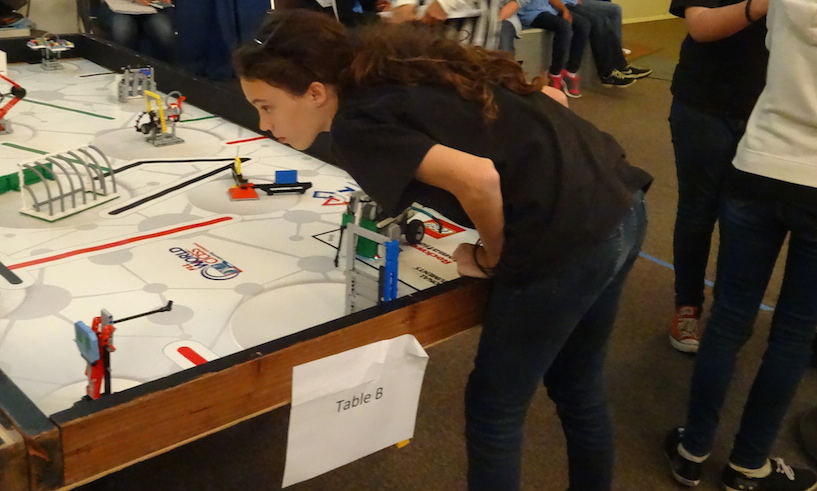 WOMEN IN TECH
WOMEN IN TECH
 WOMEN IN TECH
WOMEN IN TECH
 WOMEN IN TECH
WOMEN IN TECH
My first introduction to the world of technology came from the inside of a dumpster. My father, a HAM radio operator and lover of all things mechanical, took his four children on yearly trips to the wireless museum and taught us to take things apart.
The most exciting adventures happened at the trash bins behind his law school, where we would excavate beige gems – chunky old windows machines, IBM PC’s, 1980’s-era 8-bit Commodore VIC-20’s and 64’s. We played Atari’s Alley Cat and used algorithms for groundbreaking computing innovations, including the infinite repetition of the word “poop.”
Before I realized I was a “Woman in Technology” — before the age of 10 years old — I was exploring the world around me. As I began to realize my own gender, my perspective shifted.
It’s hard to explain what happens to girls during puberty. As both genders seem to shift from self-confidence to self-consciousness, cultural messages surrounding STEM seem to seep in: This is not a space for you. Focus your efforts elsewhere.
Despite my parents’ best efforts to maintain a healthy sense of gender equality, I felt susceptible. Boys received electrical microcontroller sets, and girls received makeup kits. Boys were asked to train for amateur radio licenses and attend hackathons, and girls were given the option, but not encouraged to dive in. On some level, I could feel myself stepping back and bowing out.
I can’t blame either of my parents, really. To their credit, they basically raised us in the Boston Science Museum. But by the time my mom decided to coach a LEGO Robotics competitive team from our house, I had already resigned myself to focus on the “research presentation” aspect of the event. It’s hard to say if this shift was my own decision, or something controlled by outside forces— a feeling that there was no need to pursue this path, a path laid out for someone else.
That is not to say that those experiences did not profoundly affect me, and still have an impact on me today. As I moved toward a career in journalism, I thought about the importance of diverse perspectives in the media I both create and consume. My mother, a staunch believer in gender equity, provided a model to reflect back on in the professional world. I thought of her, a robotics coach and a proud Trekkie, when I encountered stereotypes pushing women away from science and tech. If I could amplify more underrepresented voices in that realm, and tell more untold stories, I could do my part.
Today, the technology track still represents a challenging direction for women. According to the most recent statistics from the National Center for Women and Information Technology, women make up 25 percent of professional computing occupations in the United States. The Department of Labor’s data says 20 percent of software developers are women, and consistently, across the board, women in technology are underrepresented and paid less. It is not revelatory to say it: tech has a lady problem.
Within the tech sector, a huge effort is being put forward to remedy that problem. conferences like the Grace Hopper Celebration of Women in Computing encourage women to meet and collaborate. Organizations such as TransHackFeminist provide a safe space for female hackers to create more spaces online and to combat harassment against women. Female tech leaders are speaking up and changing the rules, and more media coverage is calling out sexism in more open ways. Yet so much media coverage crosses the thin line between recognizing the accomplishments of women without patronizing what it means to be one.
As long as there is a gender gap in tech, media coverage will either categorize women in tech as a niche genre, or largely ignore gender all together. In most cases, these articles are written by men, who dominate tech journalism. We are both astounded that women can do things men can do, and we eviscerate them when they cannot. In some cases, male journalists take a blatantly sexist approach, as evidenced by male entrepreneur John Greathouse’s advice to women to hide their gender entirely if they wish to break into tech.
If the tech sector has any hope of equalizing in terms of gender, a diverse range of voices must be heard. That means that the only voices in the room can’t be the same old guard— women’s voices must be amplified in a way that recognizes a woman’s perspective. My perspective, the voice of a professional working in an evolving field that intersects with technology and media, a disillusioned Linux-using dumpster diver —and a young woman— is needed in this space.
I want to report on the intersection of gender and technology because I have so many unanswered questions. So many talented women feel unwelcome and unwanted in the tech sector, and women still face very real obstacles on this track.
It’s not as simple as stripping ourselves down to just our initials, or earning a computer science degree. The world of women in tech exists within a larger world — one filled with complex social implications — and reporting on the contributions of women in technology requires the inclusion of voices from across the board.
This story was written as part of a Women in Tech fellowship sponsored by the GroundTruth Project and SiliconANGLE Media’s theCUBE. Other stories reported from the Anita Borg Institute’s Grace Hopper Celebration of Women in Computing conference in Houston can be found on SiliconANGLE, the TechTruth Women in Tech site and The GroundTruth Project.
THANK YOU